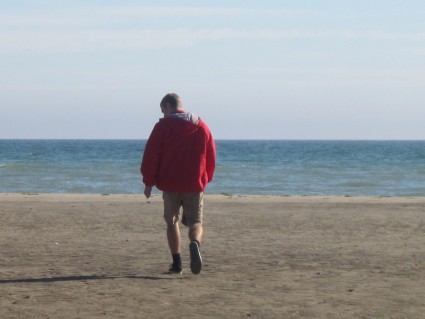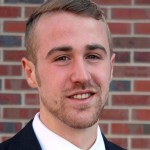From Carlisle to Normandy: A Student’s Reflections on the National History Day’s Normandy Institute
Editor’s Note: The February issue of Perspectives on History carried an article by Carlisle High School teacher Kevin Wagner, winner of the AHA’s 2015 Beveridge Family Teaching Prize. In the piece, Wagner described traveling with his student, Sam Spare, to Normandy as part of the Sacrifice for Freedom Albert H. Small Teacher Institute, created by National History Day. Here are Sam’s reflections on the institute, his relationship with his history teacher, and the process of doing historical research.
What motivated you to apply for the Sacrifice for Freedom Albert H. Small Student and Teacher Institute?
SS: I grew up in a family that loves history. My interest in World War II peaked when I discovered that our family cabin was located near a former secret German prisoner of war camp in central Pennsylvania. As a high school student, I participated in two National History Day (NHD) competitions under the guidance of Mr. Kevin Wagner and one of my NHD entries was a paper on WWII interrogators—the very men who would have worked at Camp Michaux where I hiked growing up. My research for that paper led me to Washington, DC, where I had the honor to interview several American WWII interrogators. When Mr. Wagner announced the opportunity to apply for the institute, I knew it would provide a unique opportunity to further understand the complexities of WWII.

Sam Spare on Omaha Beach, Normandy, France.
What was it like to participate in the institute? Can you describe some of your experiences?
SS: I participated in the institute during my junior year of high school. Of course I was excited to be selected along with Mr. Wagner, but when a stack of WWII books arrived shortly after Christmas that year, I realized that it was going to be a huge commitment during an already busy academic year. The weekly readings, however, taught me to better manage my time and through our weekly assignments online I was able to interact with other students from all over the country who also shared my interest in history.
When I think back on our time in France, aside from the profound experience of standing next to Flight Officer William T. McCabe’s grave, two clear memories standout. At Pointe du Hoc, the promontory overlooking the English Channel, you can still see the massive physical scars of the battle that took place in the form of bomb craters. This eerie moon-like landscape is a stark contrast to the smooth serene beaches below where you know so many young men lost their lives. I experienced this feeling again after visiting the German cemetery with its large dark crosses roughly chiseled from dark basalt. In the American cemetery, where I read McCabe’s eulogy, individual white honed marble crosses mark our heroes. Witnessing these contrasts firsthand left a strong impression on me and are experiences that I still remember vividly.
What did you learn about the process of doing historical research as a participant in the institute? What were some of the most striking things that you found during your research?
SS: While visiting the National Archives was incredible, what I really learned during my research was that fascinating information lies right in your own community and that so many people are willing to help you discover history. A simple county historical society microfilm search of obituaries from the time of the Normandy invasion lead me to uncover the life, service and family of Flight Officer McCabe.
While McCabe’s family no longer lives in my hometown, I was able to walk through our local cemetery where his younger brother was buried, open the pages of his high school yearbook to learn of his interests, and obtain pictures of family and even his high school diploma. Further research led me to connect with his nephew and his brother, and soon I became an extension of the McCabe family. Needless to say, it was quite an honor to return to them an American flag that I had placed in the soil next to McCabe’s grave. I was quite humbled when the family sent me a plaque to express their gratitude for researching and honoring their relative.
How did your relationship with your teacher, Kevin Wagner, impact your learning? What aspects of the student/mentor relationship did you find the most meaningful?
SS: Interestingly enough, I never was in a history class taught by him—Mr. Wagner is one of those outstanding educators whose reach goes beyond the classroom. He was my advisor for the National History Day competition and the Model United Nations Club. Mr. Wagner works tirelessly and treats all students with extraordinary respect. In turn, students work hard to meet his high standards. I know I am not the only student to benefit from his guidance and encouragement. And I am proud that other students will continue the legacy of honoring WWII soldiers through the Silent Heroes project.
What lessons from the institute, particularly about the value of history and historical research, have you taken forward?
SS: I can look back on that busy high school semester and now see the incredible value of our extensive research. Our historical probing was not done to prepare for a “test,” but rather to gain understanding and knowledge. My research skills have also served me well in college and I have utilized the critical thinking skills I developed through my participation in the institute across disciplines. On a personal note, I learned from three different men—Mr. Small, Mr. McCabe, and Mr. Wagner—the meaning of sacrifice, honor, and integrity.
 Sam Spare is a junior at the University of Denver double majoring in accounting and German. He recently studied abroad in Switzerland at the University of St. Gallen. He has found the perfect intersection of his interest in skiing, alpine adventures, and WWII history though studying the 10th Mountain Division. His Silent Heroes project on William T. McCabe can be found at http://35982317.nhd.weebly.com/index.html.
Sam Spare is a junior at the University of Denver double majoring in accounting and German. He recently studied abroad in Switzerland at the University of St. Gallen. He has found the perfect intersection of his interest in skiing, alpine adventures, and WWII history though studying the 10th Mountain Division. His Silent Heroes project on William T. McCabe can be found at http://35982317.nhd.weebly.com/index.html.
This post first appeared on AHA Today.
Tags: AHA Today Resources for Undergraduates Global History
Comment
Please read our commenting and letters policy before submitting.






